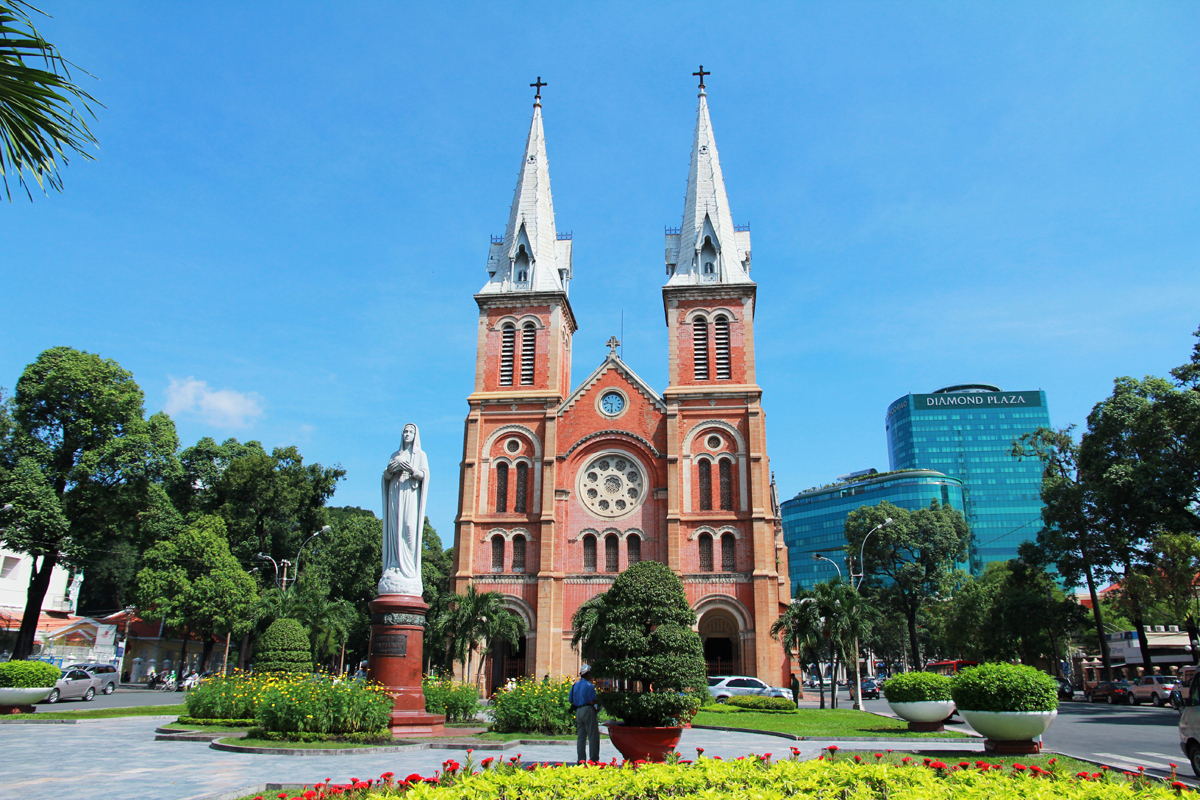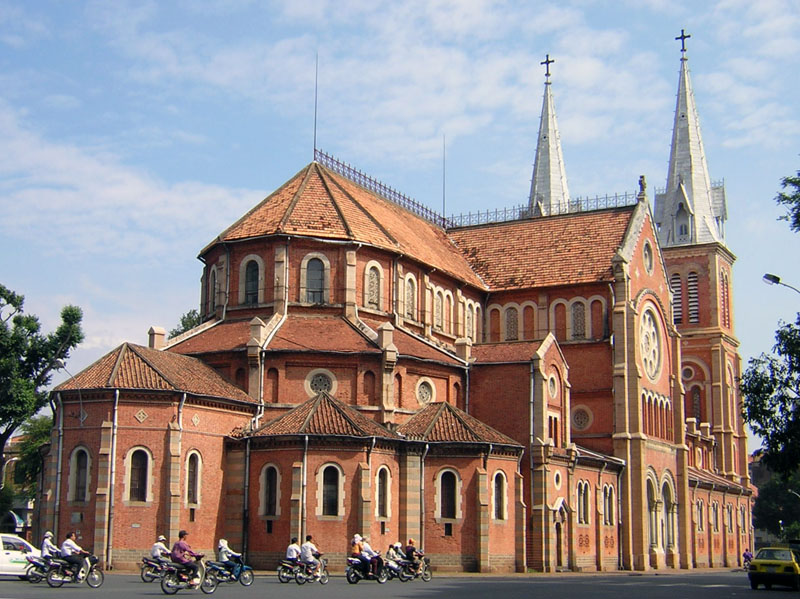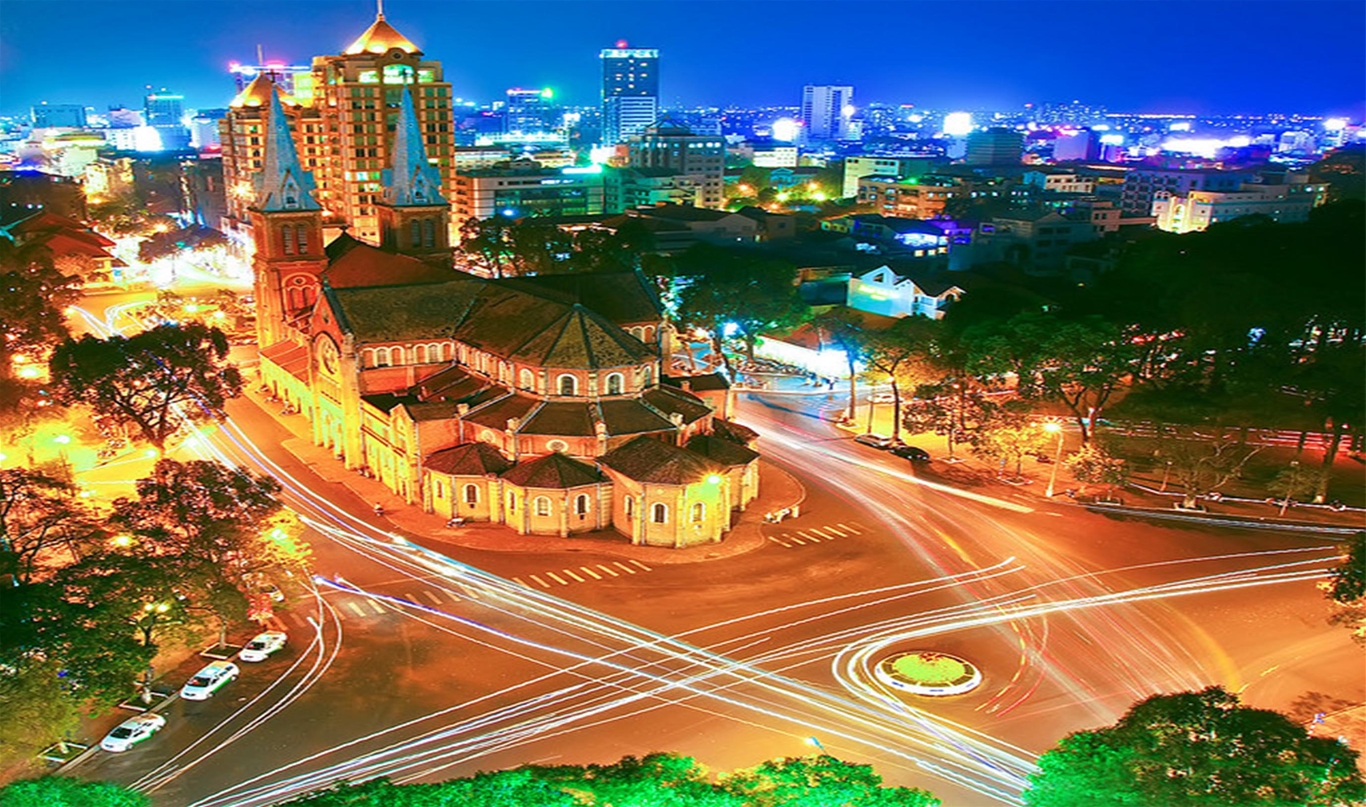Saigon Notre-Dame Cathedral is a unique architectural works attracting numerous tourists in Ho Chi Minh City. The magnificent and ancient church brings not only a religious symbol but also an architecture retaining numerous historical - cultural values.

Saigon Notre-Dame Cathedral, also known as Saigon Notre-Dame Basilica or Duc Ba Cathedral officially Immaculate Conception Cathedral Basilica was built on 07 October, 1887 by Bishop Isidore Colombert. Built in the highest area in Saigon, the church retains a unique architecture harmoniously combined Roman and Gothic architectural style. It is a architectural masterpiece of Saigon and deserves one of the most appealing attractions in Ho Chi Minh City. Time seems not to fade splendor of this unique architecture. As a fairly particular works on urban planning - located in the center of the square, adjacent to the transportation space of the quarter, and no fences and adjacent premises; the church is conspicuously a landmark in the urban space owning beautiful views from all sides. In particular, during the construction, almost building materials and decoration would be transferred from France, such as bricks, tiles, steels, cement, stained glasses, and texture decoration, metal accessories...
The cathedral foundation was specially designed to bear 10 times the weight of the cathedral. Another characteristic is that the cathedral surface is built entirely of red brick and blue stones with meticulous calculations, component precision, and astounding standard rates without plastered. Most of the original tiles and red bricks still bear markings from Marseilles, although numerous new tiles have replaced ones damaged during the Vietnam War. Although the contractors did not use coated concrete, these bricks have retained their lively bright red color until today, not clinging any moss. The whole church maintains 56 stained glasses made in France’s Chartres Province, France.

Participating in any Ho Chi Minh City tours, tourists cannot actually miss the unique architecture of the cathedral. The church owns a length of 133m, and 35m wide. The architecture is fairly symmetrical, with its height tapering to the rear. The highest point is the bell tower in the front, to the chancel, circular apse for the choir and the chapels, prayer rooms. The architectural and decorative details are inspired with Roman and Gothic architecture - solemn and elegant. The Cathedral interior includes the chancel (the main altar) in the middle, the two sub-sacred areas, and the chapel range. The chancel retaining 21m in height is separated from 2 other sub-sacred areas by the row of dome-shaped pillars. They all combine together to sustain the Cathedral's roof. The space to celebrate and pray can accommodate 1,200 people. The row of the chapels in both sides is home to small altars with exquisite stone saint statues. The main altar in the chancel is made of the monolithic marble, 6 angel-shaped statues of which lift the surface of the altar. Notably, there are 56 stained glass windows describing characters and events in the Bible interspersing with numerous Orient's vignette and graphics. Yet, the intact currently windows are relatively few. Above the main entrance is the space of choir - which contains a pipe organ, one of the oldest organs in Vietnam. The organ is totally handmade production, serving the Church ceremonies. The architecture has created a fantastic lighting effect in the church's interior, giving a sense of stillness, holiness and solemnity. The magical light contributes to turn architectural details as well as interior inside into much more beautiful and more prominent. Thanks to the fanciful beauty, tourists will have more choices when taking part in Ho Chi Minh City travel.
One of the most prominent characteristics in Saigon Notre-Dame Basilica is its bell towers. Original bell tower of the church just owns a height of 36.6m and without roofing. Right after the bell tower were renovated and roofed (in 1895), its height was 57.6m - the highest steeple in Vietnam. The two bell towers currently contain 6 large bronze bells. These bells are made in France and own an extremely delicate texture. Only on Christmas Eve, all of bells rang together, which can be sonorous over 10km...Notably, there is also a clock between two bell towers on the facade of the church. Surface of the clock looks like a window, yet there is a bulky machine complex, weighing more than 1 ton inside. The clock was manufactured in Switzerland in 1887. Though quite old and rudimentary, it has still worked pretty accurately. The frontispiece of the cathedral is a park with four paths intersecting to form a cross. The centerpiece of the park is a statue of Our Lady of Peace (or also known as Peaceful Notre Dame). The statue was performed by sculptor G.Ciocchetti in 1959. This is also the reason why the cathedral also has been known as Saigon Notre-Dame Basilica.

Saigon Notre-Dame Cathedral is worth an architectural masterpiece, contributing to promote the appearance of urban and Saigon tourism. The cathedral has also record the arrival, exchange and harmony of East - West culture and architecture. Not only tourists far away, Saigon citizens even still admire the beauty simply magnificent and majestic, but solemn, and close. Over years and the movements, the architecture works still exists in the heart of Saigon, as an urban milestone. Notre-Dame Cathedral is considered a stop for seekers of old beauties and calmness as well as one of the most popular tourist attractions in Ho Chi Minh City.